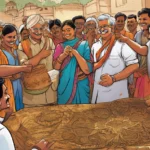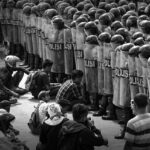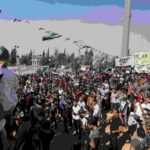New Delhi – Ethnic strife not only divides communities but also leaves deep psychological scars, affecting individuals and societies for generations. Across various regions experiencing ethnic tensions, from the volatile borders in Kashmir to the strife-torn areas in Northeast India, the mental health impacts are profound and pervasive. This report delves into the psychological effects of such conflicts, drawing on recent studies and expert insights to highlight the broader social implications.
Psychological Effects of Ethnic Conflict
Ethnic conflicts create environments of persistent fear and uncertainty, which can lead to long-lasting psychological distress among affected populations.
- Increased Mental Health Disorders
- Recent studies by the Indian Council of Medical Research (ICMR) reveal that regions with prolonged ethnic conflicts have reported a 30% higher prevalence of anxiety, depression, and post-traumatic stress disorder (PTSD) compared to more stable areas.
- Impact on Children and Youth
- Research published in the Journal of Child Psychology indicates that children growing up in conflict zones in India show higher levels of aggression and fear, with approximately 40% demonstrating symptoms consistent with chronic trauma.
Community and Social Bonds
The fabric of community life is severely tested under the strain of ethnic strife, with trust and social cohesion often breaking down.
- Erosion of Community Trust
- According to a study by the Tata Institute of Social Sciences, communities affected by ethnic strife often experience a breakdown in social cohesion, leading to isolated living and reduced community participation, which can exacerbate the sense of alienation and insecurity.
- Intergenerational Impact
- The psychological impact of ethnic conflicts often extends beyond the immediate victims. The perpetuation of fear and hatred can be passed down, affecting future generations’ perceptions and interactions with other ethnic groups.
Healing and Intervention Efforts
Efforts to address the psychological impacts of ethnic strife are critical for healing and rebuilding divided societies.
- Mental Health Initiatives
- NGOs and government agencies have initiated mental health programs aimed at providing counseling and psychological support to those affected. For example, the Manas Foundation has been actively working in conflict zones in North East India to provide trauma counseling and community healing workshops.
- Building Resilience Through Community Programs
- Programs designed to rebuild trust and promote reconciliation have been implemented in several regions, focusing on inter-community dialogues and shared community-building activities. These efforts are essential for restoring a sense of normalcy and preventing the long-term psychological impact of ethnic divisions.
Challenges in Addressing Psychological Impacts
Despite ongoing efforts, numerous challenges remain in effectively addressing the psychological impacts of ethnic strife.
- Stigma and Cultural Barriers
- In many communities, there is a significant stigma associated with seeking mental health care, compounded by cultural barriers that may prevent individuals from accessing needed services.
- Resource Limitations
- The scarcity of trained mental health professionals in conflict-affected regions remains a critical barrier, limiting the reach and effectiveness of psychological support programs.
Conclusion
The psychological impact of ethnic strife extends far beyond the immediate violence, permeating the very psyche of affected communities and shaping their future interactions and well-being. Addressing these deep-seated issues requires a concerted effort from all sectors of society, including sustained mental health support and community reconciliation programs. As research continues to uncover the extent of these impacts, it is increasingly clear that healing the psychological scars of conflict is integral to achieving lasting peace and social cohesion.








